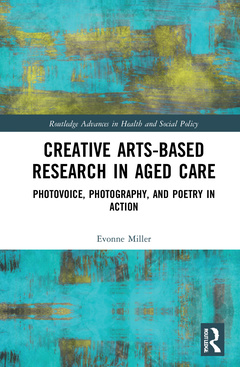Creative Arts-Based Research in Aged Care Photovoice, Photography and Poetry in Action Routledge Advances in Health and Social Policy Series
Auteur : Miller Evonne

This timely book explores what it is like to live in an aged care home: the expectations that new residents and their families enter with, their relationships with fellow residents and formal caregivers, and how they approach, in different ways, the reality that this place is where they will die.
Creative Arts-Based Research in Aged Care draws on an immersive semi-longitudinal four-year study and purposely privileges the voices and perspective of older residents. Using creative arts-based qualitative research methods, specifically participatory photography and research poetry, it demonstrates the experience of contemporary aged care from the perspective of those who matter most: older residents. Divided into three parts covering entering residential aged care, daily life in aged care and dying in aged care, the book stimulates debate and discussion about current practice, and the future of aged care in the context of rapid population ageing and care automation.
It is essential reading for all scholars and students working in the fields of gerontology, social work, psychology, design, and nursing, particularly those tasked with redesigning aged care in the twenty-first century.
1. Why we must talk about residential aged care. 2. Arts-based research. Part 1: Entering aged care. 3. Leaving home – and entering aged care. Part 2: Daily life in aged care. 4. 1022 days: why design matters. 5. Everyday life, health, and leisure. 6. Relationships with staff and family. 7. Secrets and sexuality: the value of trauma-informed care. Part 3: Dying in aged care. 8. Death and dying in aged care. 9. The transformative potential of technology. 10. Thinking differently about aged care.
Evonne Miller is Professor of Design Psychology and Director of the QUT Design Lab in the Faculty of Creative Industries, Education and Social Justice at Queensland University of Technology in Brisbane, Australia. With a background in environmental and design psychology, Evonne’s research focuses on creating sustainable, inclusive and age-friendly places – and she is a passionate advocate for creative arts-based participatory research methods.
Date de parution : 09-2022
15.6x23.4 cm
Date de parution : 03-2021
15.6x23.4 cm
Thèmes de Creative Arts-Based Research in Aged Care :
Mots-clés :
Aged Care; Residential Aged Care; Research poetry; Aged Care Residents; Participatory photography; Creative arts-based research; Aged Care Workforce; Care automation; Aged Care Environment; Aged care home; Arts Based Research Methods; Aged Care Staff; Arts Based Research; Aged Care Facility; Interesting Leisure Activities; Care Residences; Green House Model; Aged Care Quality; Documentary Photography; Trauma Informed Care; Early Life Trauma; Men’s Sheds; Photovoice Images; Research Poems; SOC Theory; Aged Care Providers; Person Centre Care; Aged Care Recipients



